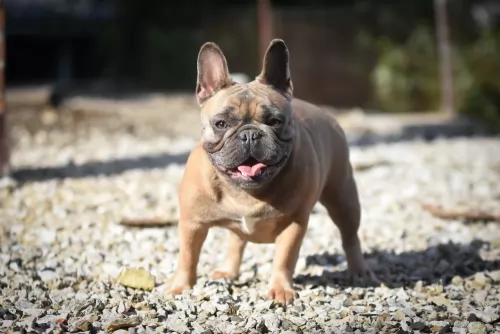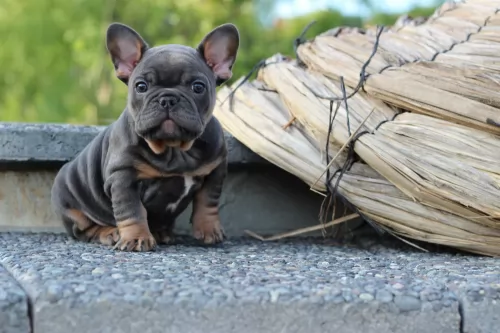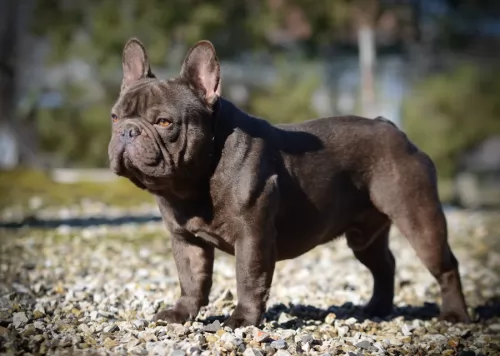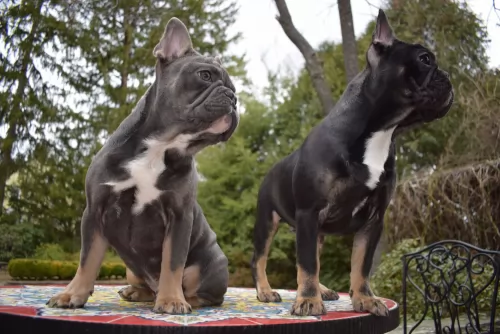 Petzlover
Petzlover Both French Bulldog and Dogue De Bordeaux are originated from France. French Bulldog may grow 32 cm / 12 inches shorter than Dogue De Bordeaux. French Bulldog may weigh 51 kg / 112 pounds lesser than Dogue De Bordeaux. Both French Bulldog and Dogue De Bordeaux has almost same life span. French Bulldog may have less litter size than Dogue De Bordeaux. Both French Bulldog and Dogue De Bordeaux requires Low Maintenance.
Both French Bulldog and Dogue De Bordeaux are originated from France. French Bulldog may grow 32 cm / 12 inches shorter than Dogue De Bordeaux. French Bulldog may weigh 51 kg / 112 pounds lesser than Dogue De Bordeaux. Both French Bulldog and Dogue De Bordeaux has almost same life span. French Bulldog may have less litter size than Dogue De Bordeaux. Both French Bulldog and Dogue De Bordeaux requires Low Maintenance.
 The french bulldog originated in England and are bred expecting small size bulldogs. Many lace workers in Nottingham had little bulldogs and when they emigrated to france, they brought their dogs with them. Soon they become popular in France and Europe. Then Americans showed interest in them.In 1896 frenchie was shown in United states in a show and after that they got their nickname "Frechie".
The french bulldog originated in England and are bred expecting small size bulldogs. Many lace workers in Nottingham had little bulldogs and when they emigrated to france, they brought their dogs with them. Soon they become popular in France and Europe. Then Americans showed interest in them.In 1896 frenchie was shown in United states in a show and after that they got their nickname "Frechie".
 The Dogue de Bordeaux is an ancient French dog breed and his history goes so far back that it is difficult to have accurate records of his origin.
The Dogue de Bordeaux is an ancient French dog breed and his history goes so far back that it is difficult to have accurate records of his origin.
During the 1700s he was used as a guard dog, with theories suggesting that several Mastiff type breeds were the closest ancestors.
For centuries the Bordeaux Mastiff, also referred to as the Bordeaux Bulldog, came in two size varieties, with the larger version being the Dogue de Bordeaux. It is this large dog which made its appearance in the Hollywood movie ‘Turner & Hooch’, shooting him into more recognition and interest.
 Frenchie is a good companion dog and has a powerful muscular body. They like to play but also likes to relax for more time. They are intelligent and training them is very easy until they think it a game. They are free thinkers and are not very good in obedience. Frenchies should not be leaved alone for a long time.They love spending time with humans and generally they get along with everyone. They are excellent watchdogs and alerts when strangers come.
Frenchie is a good companion dog and has a powerful muscular body. They like to play but also likes to relax for more time. They are intelligent and training them is very easy until they think it a game. They are free thinkers and are not very good in obedience. Frenchies should not be leaved alone for a long time.They love spending time with humans and generally they get along with everyone. They are excellent watchdogs and alerts when strangers come.
French bulldog suits very well in apartments. But they should be made to walk for fifteen minutes daily to avoid over weight. They should not be kept outside on hot days. Frenchies will be very happy if you stay in home. They will follow you wherever you walk inside the house. They love people so much, such that people who own a Frenchie can not imagine life without them.
 The Dogue de Bordeaux is a large molosser type dog with a large head, standing at 60 – 67cm and weighing anything between 54 and 65kg. His weight comes more from his muscular, powerful build rather than his height.
The Dogue de Bordeaux is a large molosser type dog with a large head, standing at 60 – 67cm and weighing anything between 54 and 65kg. His weight comes more from his muscular, powerful build rather than his height.
He is a powerful looking dog and his short coat is loose-fitting and is an attractive rich reddish brown color. There are wrinkles around the face with the nose being somewhat pinkish-orange as opposed to black.
The eyes are wide apart and are hazel. He has short to medium length floppy ears and where once the thick tail was docked, giving him a powerful, distinctive look, it is mostly left long today.
He is a confident, self-assured, territorial dog who will require training and socialization if he is to know his place in the home. He is a powerful mastiff-type dog, who without training can be stubborn, arrogant and somewhat aggressive towards strangers.
His looks and his territorial nature make him an excellent watchdog. He is no push-over and isn’t a good choice for the first time dog owner.
Without a strong, firm owner, he could prove difficult to handle. He is calm and laid back with children in the home and he can get along well with other pets if he has been brought up with them since puppy-hood.
 They are good children friendly dogs as they like to play with them. It will be good if they are supervised by an adult.
They are good children friendly dogs as they like to play with them. It will be good if they are supervised by an adult.
They are polite with everyone including other pets. They love to play games and chase balls but don't need much exercise.
Frenchies adapts well for apartment living but they don't like being alone for long time. They will not tolerate both hot and cold weather and so air conditioning will be better.
French Bulldogs are easy to train and are very much interested in playing.
 The Dogue de Bordeaux isn’t a big, boisterous kind of dog but is rather calm and relaxed. As a watchdog however, he can surprise you and become quite active, showing agility for such a hulk.
The Dogue de Bordeaux isn’t a big, boisterous kind of dog but is rather calm and relaxed. As a watchdog however, he can surprise you and become quite active, showing agility for such a hulk.
He can adapt to life in the city or the country but even though he appears lazy, he will need moderate daily exercise.
He loves his human family and wants to be constantly with them. He is stubborn but will do well with training and socialization.
Calm and easy-going and with his easy-to-maintain short, soft coat, be prepared for some drooling and snoring from this loving, devoted large pet of yours.
 Frenchies can suffer from Von Willebrand's disease(VWD)and thyroid condition. Due to their flat faces they suffer from elongated soft palate or cleft palate. Because of their compacted air way they have inability to effectively regulate temperature.
Frenchies can suffer from Von Willebrand's disease(VWD)and thyroid condition. Due to their flat faces they suffer from elongated soft palate or cleft palate. Because of their compacted air way they have inability to effectively regulate temperature.
Any indication that the hair is unhealthy, such as brittleness and hair loss, should be addressed immediately to avoid any further damage. Hair loss becomes a problem when it becomes excessive, possibly due to disease or a particular condition.
 The Dogue De Bordeaux doesn’t have as long a lifespan as many other dogs, but with good care, can go to 7 – 10 years of age.
The Dogue De Bordeaux doesn’t have as long a lifespan as many other dogs, but with good care, can go to 7 – 10 years of age.
Because he is a brachycephalic breed – a short-nosed dog such as the Boxer, Pug and Bulldog – he may well have the same number of teeth as other dogs, but the teeth are crowded, putting dogs like this at higher risk of getting dental disease.
His teeth will need to be brushed 2 or 3 times a week to prevent plaque and tartar getting trapped.
Brachycephalic Syndrome is also something to watch out for with your Dogue de Bordeaux. It’s an upper respiratory disorder which can bring on difficulty with breathing because of the crowding of tissue and narrower airways.
 As with all dogs, proper nutrition makes your French Bulldog a happy, healthy pup. He should have his own food and water bowls. Don't feed your French bulldog puppy, uncooked meat or food that may have gone bad. Young puppies need relatively large amount of food in order to meat the demands of their rapidly growing bodies and their hectic lifestyle. Feed your puppy specially designed chewing treats from reputable pet stores.
As with all dogs, proper nutrition makes your French Bulldog a happy, healthy pup. He should have his own food and water bowls. Don't feed your French bulldog puppy, uncooked meat or food that may have gone bad. Young puppies need relatively large amount of food in order to meat the demands of their rapidly growing bodies and their hectic lifestyle. Feed your puppy specially designed chewing treats from reputable pet stores.
According to the French BullDog Club of America, there are no specific guidelines for feeding them. Options for feeding your French Bulldog are commercial dry food, canned food, raw food and homemade meals. Calories required for frenchie varies depending on size, age, activity level and metabolism.
Frenchies can be made to walk or run for a particular distances. Heavy exercises should not be given as they face respiratory problems. Avoid exercising them in hot weather as they have chances of getting heatstroke.
 He isn’t the most active dog and he is inclined to snooze quite a bit throughout the day. It will nonetheless be a good idea to include him in your daily walks and allow him to take part in a ball game now and again.
He isn’t the most active dog and he is inclined to snooze quite a bit throughout the day. It will nonetheless be a good idea to include him in your daily walks and allow him to take part in a ball game now and again.
The Dogue de Bordeaux needs to be fed a high-quality dog food in keeping with his large size and age.
This dog is known for drooling, and because of his wrinkled face, you’ll need to be watching the facial area that it is kept clean and dry to avoid skin infections. Check his ears at the same time to ensure they are free from dirt and wax.
The short coat does shed throughout the year, and you will need to be brushing him down twice a week to remove all those loose hairs.